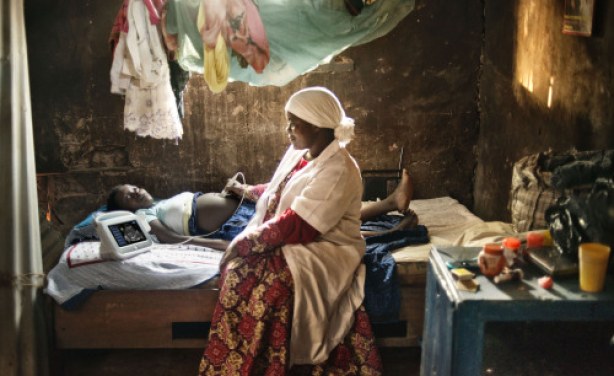 VOA News – Improving maternal and newborn health remains a pressing priority for many countries. But bringing both mother and baby safely through childbirth can be difficult in settings where health resources are in short supply.
VOA News – Improving maternal and newborn health remains a pressing priority for many countries. But bringing both mother and baby safely through childbirth can be difficult in settings where health resources are in short supply.
GE has launched a new portable ultrasound system designed for primary healthcare workers – including midwives, general practitioners, paramedics and clinical officers – especially in under-resourced areas. The Vscan Access was designed with the input of healthcare providers in developing countries, and so includes a rugged design, battery operation and Bluetooth connectivity. Software tools, such as pregnancy education videos for patients, a multi-lingual user interface and a reference library of scan images for novice users can be accessed via a touchscreen.
In 2010, GE made a commitment to the United Nations to develop evidence-based solutions for maternal and child health by 2015. Vscan Access is the latest in a portfolio of accessible ultrasound products to help meet that commitment.
“Studies have shown ultrasound can help enable task-shifting to midwives for basic obstetric scanning, mobilise expectant mothers to seek ante-natal care and improve pregnancy management through early detection and referral of pregnancy complications,” said Anders Wold, President and CEO of GE Healthcare’s Ultrasound business.
Wold said GE Healthcare had spent five years conducting field research in more than 20 countries in order to help stakeholders overcome primary care challenges including physician shortages in high-mortality and low-resource areas, lack of demand for antenatal care, and lack of access to diagnostic devices.
In addition to new diagnostic tools, GE Healthcare is supporting healthcare providers and policy-makers in developing nations with training, comprehensive service coverage and access to other elements of its comprehensive portfolio of low-cost devices to help during pregnancy and deliveries, including: warmers, incubators, resuscitation devices and anesthesia.
Building upon the demonstrated impact of ultrasound in Africa
In recent years, GE Healthcare has collaborated with governments, academic researchers and non-governmental organisations (NGOs) on several research studies to assess the maternal health impact of ultrasound use in primary care facilities. For example, in a study led by the Ifakara Health Institute in Tanzania, 14 primary health workers including midwives, nurses and medical attendants were trained for 10 days in the use of a handheld ultrasound device, and performed basic obstetric ultrasound scanning at rural dispensaries and district hospitals. In an evaluation of their diagnoses, an independent senior radiologist confirmed users’ accuracy to be higher than 80 per cent, demonstrating that task-shifting obstetric ultrasound could be an effective way to expand access to antenatal diagnostic imaging.
Other peer-reviewed studies of ultrasound usage have also demonstrated:
- In Uganda, ultrasound implemented in a primary care facility led to a 72% increase in total antenatal care visits, and four times as many women attending four or more ANC visits.
- Making ultrasound available to midwives in Zambia resulted in 17% of obstetric cases having a change in the clinical management of a patient, particularly with malpresentation and multiple gestations.










